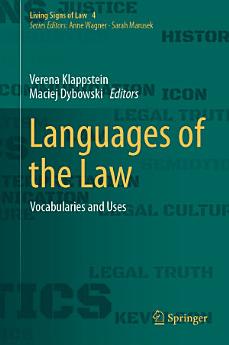Languages of the Law: Vocabularies and Uses
About this ebook
The chapters in this volume tackle three broad problem areas to offer a coherent picture of languages of the law. The first section is devoted to legal language at large, including reflections on its nature and some distinct functions it performs in the legal domain. The second section of the book focuses on the distinctly legal and pragmatic dimensions of some fragments of vocabulary, used either in legal texts or in legal scholarship. In the third section of the volume, authors research specific questions regarding legal language and legal reasoning.
About the author
Dr. iur. Verena Klappstein M.A., LL.M. currently works at the Institute for German and European Private Law, Civil Procedure Law and Legal Theory, professorship of Prof. Dr. Thomas Riehm, Universität Passau. Verena does research in Civil Law, Company Law and Legal Fundaments. Besides working on her Habilitation, current projects are on (Legal) Reasoning and procedural law.
Dr Maciej Dybowski is an assistant professor in the Department of Legal Theory and Philosophy at Adam Mickiewicz University where he completed his master’s degree in law and Ph.D. He also holds master’s degree in philosophy from the Jagiellonian University in Kraków. Maciej’s research interests include philosophy of law, axiology, philosophical anthropology and philosophy of language. More specifically, his work focuses on analytic pragmatism in legal philosophy, practical reasoning and philosophy of human rights.







